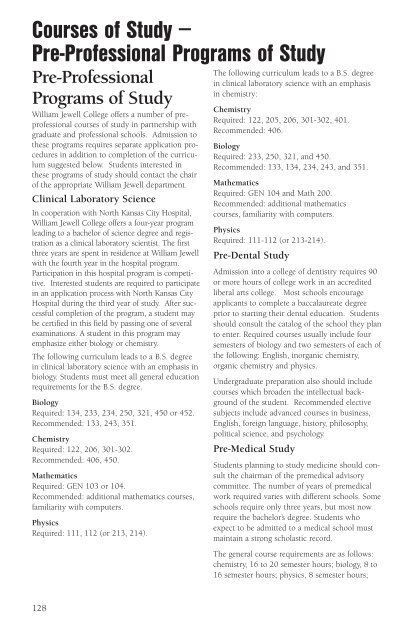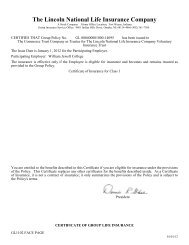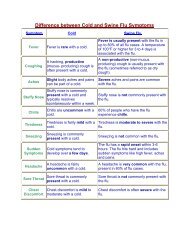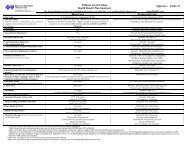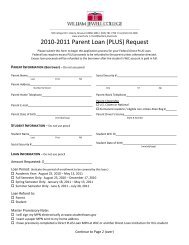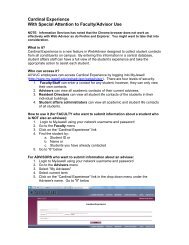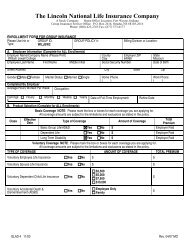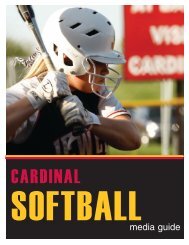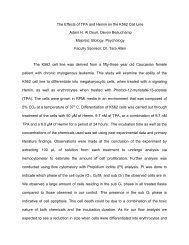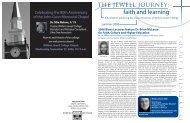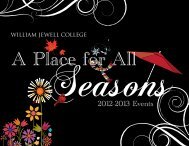Courses of Study - William Jewell College
Courses of Study - William Jewell College
Courses of Study - William Jewell College
You also want an ePaper? Increase the reach of your titles
YUMPU automatically turns print PDFs into web optimized ePapers that Google loves.
<strong>Courses</strong> <strong>of</strong> <strong>Study</strong> –<br />
Pre-Pr<strong>of</strong>essional Programs <strong>of</strong> <strong>Study</strong><br />
Pre-Pr<strong>of</strong>essional<br />
Programs <strong>of</strong> <strong>Study</strong><br />
<strong>William</strong> <strong>Jewell</strong> <strong>College</strong> <strong>of</strong>fers a number <strong>of</strong> prepr<strong>of</strong>essional<br />
courses <strong>of</strong> study in partnership with<br />
graduate and pr<strong>of</strong>essional schools. Admission to<br />
these programs requires separate application procedures<br />
in addition to completion <strong>of</strong> the curriculum<br />
suggested below. Students interested in<br />
these programs <strong>of</strong> study should contact the chair<br />
<strong>of</strong> the appropriate <strong>William</strong> <strong>Jewell</strong> department.<br />
Clinical Laboratory Science<br />
In cooperation with North Kansas City Hospital,<br />
<strong>William</strong> <strong>Jewell</strong> <strong>College</strong> <strong>of</strong>fers a four-year program<br />
leading to a bachelor <strong>of</strong> science degree and registration<br />
as a clinical laboratory scientist. The first<br />
three years are spent in residence at <strong>William</strong> <strong>Jewell</strong><br />
with the fourth year in the hospital program.<br />
Participation in this hospital program is competitive.<br />
Interested students are required to participate<br />
in an application process with North Kansas City<br />
Hospital during the third year <strong>of</strong> study. After successful<br />
completion <strong>of</strong> the program, a student may<br />
be certified in this field by passing one <strong>of</strong> several<br />
examinations. A student in this program may<br />
emphasize either biology or chemistry.<br />
The following curriculum leads to a B.S. degree<br />
in clinical laboratory science with an emphasis in<br />
biology. Students must meet all general education<br />
requirements for the B.S. degree.<br />
Biology<br />
Required: 134, 233, 234, 250, 321, 450 or 452.<br />
Recommended: 133, 243, 351.<br />
Chemistry<br />
Required: 122, 206, 301-302.<br />
Recommended: 406, 450.<br />
Mathematics<br />
Required: GEN 103 or 104.<br />
Recommended: additional mathematics courses,<br />
familiarity with computers.<br />
Physics<br />
Required: 111, 112 (or 213, 214).<br />
The following curriculum leads to a B.S. degree<br />
in clinical laboratory science with an emphasis<br />
in chemistry:<br />
Chemistry<br />
Required: 122, 205, 206, 301-302, 401.<br />
Recommended: 406.<br />
Biology<br />
Required: 233, 250, 321, and 450.<br />
Recommended: 133, 134, 234, 243, and 351.<br />
Mathematics<br />
Required: GEN 104 and Math 200.<br />
Recommended: additional mathematics<br />
courses, familiarity with computers.<br />
Physics<br />
Required: 111-112 (or 213-214).<br />
Pre-Dental <strong>Study</strong><br />
Admission into a college <strong>of</strong> dentistry requires 90<br />
or more hours <strong>of</strong> college work in an accredited<br />
liberal arts college. Most schools encourage<br />
applicants to complete a baccalaureate degree<br />
prior to starting their dental education. Students<br />
should consult the catalog <strong>of</strong> the school they plan<br />
to enter. Required courses usually include four<br />
semesters <strong>of</strong> biology and two semesters <strong>of</strong> each <strong>of</strong><br />
the following: English, inorganic chemistry,<br />
organic chemistry and physics.<br />
Undergraduate preparation also should include<br />
courses which broaden the intellectual background<br />
<strong>of</strong> the student. Recommended elective<br />
subjects include advanced courses in business,<br />
English, foreign language, history, philosophy,<br />
political science, and psychology.<br />
Pre-Medical <strong>Study</strong><br />
Students planning to study medicine should consult<br />
the chairman <strong>of</strong> the premedical advisory<br />
committee. The number <strong>of</strong> years <strong>of</strong> premedical<br />
work required varies with different schools. Some<br />
schools require only three years, but most now<br />
require the bachelor’s degree. Students who<br />
expect to be admitted to a medical school must<br />
maintain a strong scholastic record.<br />
The general course requirements are as follows:<br />
chemistry, 16 to 20 semester hours; biology, 8 to<br />
16 semester hours; physics, 8 semester hours;<br />
128


